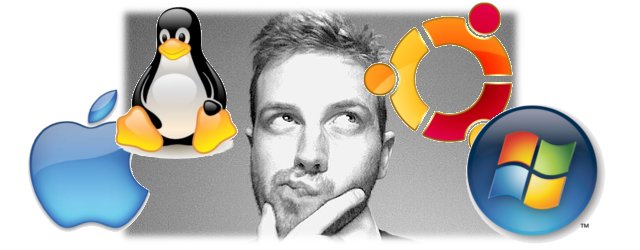It seems some people are unsure, when buying a new Computer, which Operating System (OS) to choose. The answer isn’t as simple as saying “This one is the best!”. It really comes down to personal taste, and which system suits the tasks you’re trying to perform. For this article, I’m going to focus on the 3 leading OSs in the market at the moment:
For this article, I’m going to focus on the 3 leading OSs in the market at the moment:
- Windows
- Mac OS X
- GNU/Linux – We’ll be focusing on Ubuntu, which currently has the most hits on Distrowatch
We’ll start with Windows: Windows is an Operating System released by Microsoft in 1985, originally a front end for DOS – Disk Operating System, (Primarily MS-DOS) and became classed as a stand alone Operating System in 1993 with the release of Windows NT for business use. Microsoft continued to develop Windows that ran on top of DOS until 1999, with Windows Millennium Edition being the last one to use this technique. Since then, all releases of Windows for the home user (Starting with Windows XP) have been based on Windows NT.
Windows currently has the largest market share, this is mainly due to Microsoft’s deal with PC manufacturers to include their software on their machines. This quickly meant that Windows and Microsoft became well known household names. It no mystery why most software companies write software for the Windows platform.
Windows is famous for having the ability to become really unstable, especially after being installed on a machine for a length of time. People often joke about Windows systems having a half-life and when that point is reached, one should “Refomat and Reinstall” to get a usable system again! This isn’t totally a fault with Windows itself though. 99% of the time, crashes and performance issues are down to 3rd party software, and drivers, as well as malware which has been written for Windows systems (due to it’s large market share!)
As the majority of software is written for Windows, including games, most people would choose a Windows system. If gaming is really what you’re after, then I’d definitely recommend using Windows for the greatest compatibility! Windows is also the operating system of choice in the business environment, this could be due to the relatively low prices IBM compatible machines were (compared to Macs) in the late 80s and early 90s.
Windows itself is closed source (proprietary) software, this means only Microsoft can improve it and fix bugs that might be in it. But this generally means there is a lot of focused testing by a dedicated team before it’s released to the general public and a heafty price tag has been put on it!
Mac OS X: OS X is much cheaper, this is because it only works on computers made by Apple Computers. Apple make this money from their hardware, but still make a very secure and stable Operating System. OS X was released in 2001 to replace the classic Macintosh Operating System used on Macs until then. It is based on a variation of Unix (Unix, which has been in development since 1969), called Darwin (first released in 2000). OS X have the second largest share in the market, but is quite a bit behind Windows. Apple’s “Get A Mac” adverts, which aired in many countries around the world, along with the popularity of devices such as the iPod, have boosted OS X’s popularity in the past 10 years.
There aren’t as many companies writing software for OS X, but most applications you’d use on Windows, have an equivalent on a Mac. Microsoft even still release Microsoft Office for the Mac (as a side note, the Office application “Word” was the first application from the Office family, and was released for Xenix (a Unix system written by Microsoft) in 1983, then released for the Mac in 1984, before Windows itself was released!)
Games are becoming more popular on OS X, though you’ll still find many of the titles you love to play on your Windows machine unavailable for OS X. Though Macs can now run Windows through Bootcamp.
Macs are more seen as “Creativity Machines” as they are mainly used for Music, Video and Graphical production, and are rather efficient at doing those things as OS X is generally more stable.
Some people run OS X on PCs (since Macs have been using Intel Processors), these machines are often dubbed as a “Hackintosh”, but doing this violates Apple’s licence, so the only legal way to use OS X is on a Mac.
OS X is also closed souce software, so once again, it’s up to Apple to provide updates and bug fixes!
Ubuntu: And finally there is Ubuntu, Based on GNU/Linux. Linux based systems are often frowned upon for being free, and “only good for servers” or “too hard for a casual computer user to use”, this perception is now outdated. 10 years ago, this might have been the case, as alot of drivers had to be compiled from source code, as well as software. Now systems like Ubuntu provide support for hardware out-of-the-box (the latest version of Ubuntu, 10.04 – Lucid Lynx, even supports the touch screen on my tablet PC without any configuring!), and software is usually managed by the package manager. This means that when your computer says “There are updates available”, not only is it able to update the operating system, but pretty much all of the software you have installed! This keeps the whole system free of bugs!
The Linux Kernel was created in 1991, and Ubuntu was first released in 2004, though it is important to note that Ubuntu isn’t the only Linux system available, it’s just currently the most popular!
Sadly, as Linux systems are 3rd place in the market share, not many software vendors write software for it. But it is an Open Source system, and most of the software available for it is also open source. Open Source means that the code used to make these programs are freely available and can be changed to improve the system, they can then be submitted back the the original project, or the whole project can be forked and a separate program can be created, based on the original. Bug fixes and improvements are provided by the community. This means there’s no dedicated team of testers, but it does mean if a problem is found, it can be fixed very quickly! A project called WINE is able to run many Windows applications (including Microsoft Office 2007) quite well now, and with the rate it’s improving, I wouldn’t be surprised if within a few years, it will be able to run 90% of Windows applications available! Unless you’re using WINE, you’ll probably find it hard to game on a Linux system, even though games like World of Warcraft are available, most titles will require WINE to even have a chance to run on a Linux system at all!
Linux systems (including Ubuntu) are very stable due to the software and drivers being written and revised by the community, people with more understanding of the system can optimise drivers to work better with it! This is one of the reasons why Linux systems have been used on servers for a long time! As the Ubuntu desktop editions have been designed for the average user, the popularity of Linux on home computers had increased quite a bit in the past 10 years. I, myself, have been using Linux systems since 2002, and started using it full time in 2006, and in that short space of time, I could see many of the projects producing Linux systems making it easier for the end user to actually use the system!
Personally, I don’t think Linux based systems are quite there just yet to be a potential replacement to Windows in the market share, but give it a few years, and I think it might even give Mac OS X a run for its money! But if all you want is a machine that can word process, watch movies, listen to music, and browse the internet, then this is already definitely an option for you! Image, video, and music editing are still easier on a Mac or a Windows system, but there are projects (open source) that are able to do this under Linux and, once again, in a few years, may put the closed source programs to shame! In the world of image editing, some people are already switching from Photoshop, to the popular Open Source program GIMP (GNU Image Manipulation Program).
Ubuntu is well worth looking in to, and can be installed along side Windows or Mac (depending on the machine you use).
So in a nutshell:
- Windows – Most compatible with software, plenty of software written for it, gaming central, but is expencive, can be unstable at times, and is often targeted by malware writers!
- Mac OS X – Stable, great for creativity, but not as many games for it, and requires you to buy a Mac to use it legally!
- Ubuntu – Easy to use and maintain, very stable, but not many companies writing software for it, gaming lacks here too, but it is becoming increasingly popular and getting better all the time!
As you can see, it really depend on what you want to use your computer for as to what OS to use. It’s not just a simple answer of “This one’s the best!”
Cheers













